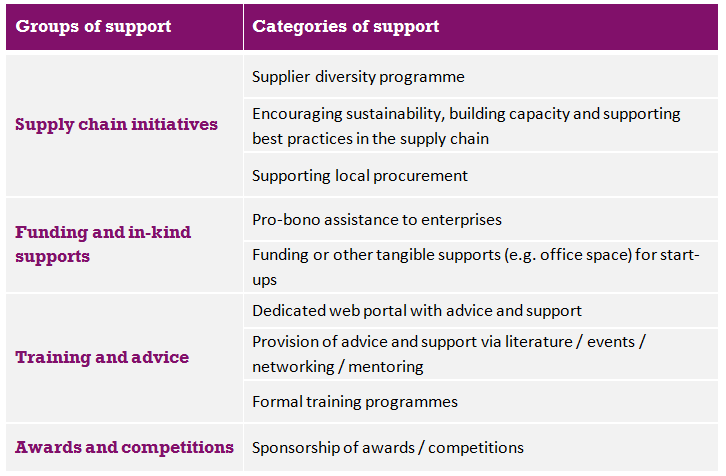Stimulating Businesses and the Economy: How large companies in Ireland are supporting Small to Medium Enterprises
SMEs are often quoted as ‘the lifeblood of a country’s economy’; they are essential to generating good jobs, currently employing almost seven out of every ten persons in the business economy.[i] Hence supporting the growth and development of SMEs can have far-reaching economic and social impacts – for example, stimulating the economy. Governing bodies are taking an important stance in supporting SMEs, putting in place programmes and policies aimed at developing these businesses.
For example, the UN Sustainable Development Goal # 8 contains a target around encouraging the growth of micro-, small- and medium-sized enterprises, elevating the topic on an international stage. At a national level, the National Action Plan for Jobs 2016 included a series of measures to support SMEs. The reality is however that the input of the corporate community is needed to drive this agenda forward. In fact BITCI has identified a growing trend in large companies of initiatives being implemented to support smaller businesses. As the network for responsible business in Ireland, BITCI is in the unique position of being able to gain access to data and draw insights that shines a light on what role precisely corporates are playing in supporting and developing SMEs. This article seeks to outline the key findings from the preliminary research we conducted into this topic with a view to prompting further discussion and action. This is the first in a series of four articles which explore this topic in more detail.
While the data collated wasn’t a holistic list of initiatives undertaken by companies to support SMEs, some very clear findings were emerging:
- The types of initiatives undertaken by large companies can be classified into nine categories or four groups as outlined in the table below. For examples of specific initiatives in companies that are undertaking, see our second article in this series.
Supply chain initiatives are the most common type of support amongst companies included in the research, of which supporting local procurement is popular.
- The research implies that there is no evidence that B2B companies are more likely to engage in programmes to support SMEs than B2C companies suggesting that there is a business case for all companies. Benefits include reduced risk in the supply chain, building reputation and trusted relationships with suppliers and customers and providing new sources of income.
- The findings suggests what the most common supports provided to SMEs are by large companies however this is not an indicator of what supports SMEs value most and would benefit most from. In fact, there is limited data available on the impact initiatives to support SMEs is having. One study in the US of 200 companies found that 7 in 10 increased in revenue and size within two years of becoming part of the corporate supplier base.[ii] Research by the UK Government[iii] shows that small business owners believe increasing skills in their workforce is an effective way to grow their enterprise. More research needs to be undertaken to ascertain what initiatives would deliver the greatest impact to SMEs while also benefitting the large companies providing the support.
- Initiatives aimed at SMEs are not always labelled as being part of a company’s CSR programme however they are a very important strand to it, enhancing the strategic nature of a company’s CSR programme. There is a question mark however over whether resources and functions are joined up internally within companies to ensure everyone is working towards shared objectives for such initiatives. For example, to maximise the benefits that accompany initiatives aimed at supporting SMEs, internal stakeholders that may need to be aligned include the Business Development Team, Procurement Team, CSR Team and Marketing / Communications Team.
- While global supplier diversity programmes are in place in many multi-national companies, the translation of these programmes into local Irish programmes is very low (one in ten in the research sample). It remains to be seen whether a push will come from the global headquarters of these multi-nationals to instigate such programmes at a local level and contribute to global targets around their supply chain diversity. If so, Irish subsidiaries of these organisations will need to be ready to address this challenge in the Irish context.
- ‘Buy Social’[iv] is a concept that is slowly starting to emerge amongst Irish companies. Buy Social entails purchasing required goods and services from social enterprises – essentially businesses that trade for social or environmental reasons. Typically social enterprises are SMEs. Hence the Buy Social concept is a natural extension of sustainable procurement efforts focused on supplier diversity and supporting SMEs. The concept allows organisations to fulfil a business need while concurrently maximising their social impact and therefore there is a strong business case for procuring from social enterprises.
If you would like to learn more about how your company can support SMEs or what initiatives your peer companies are engaged in, contact Jen at jcasey@bitc.ie.
Related topics:
Article 2: Stimulating businesses and the economy: how large companies in Ireland are supporting Small to Medium Enterprises – Examples of Companies’ Initiatives [Members Only]
Article 3: Stimulating businesses and the economy: how large companies in Ireland are supporting Small to Medium Enterprises – The Business Case and How to Set Up Initiatives to Support SMEs [Members Only]
Article 4: Stimulating businesses and the economy: how large companies in Ireland are supporting Small to Medium Enterprises – Supplier Diversity Programmes [Members Only]
[i] Business in Ireland 2012 Report – CSO
[ii] https://nycfuture.org/images_pdfs/pdfs/GivingSmallFirmstheBusiness.pdf
[iii] https://www.gov.uk/government/uploads/system/uploads/attachment_data/file/414963/bis-15-151-small-business-survey-2014-sme-employers_v1.pdf
[iv] ‘Buy Social’ is a term used mainly in the UK and Canada to denote the encouragement of social value purchasing across the community, private and public sectors. A similar, related term is ‘Buying Social’, a term coined by the European Commission to denote taking social considerations into account in public procurement.



